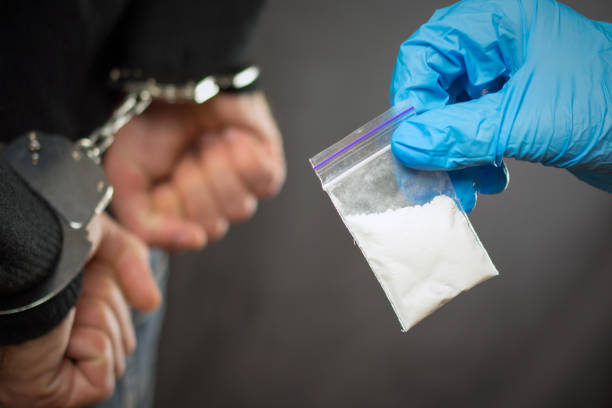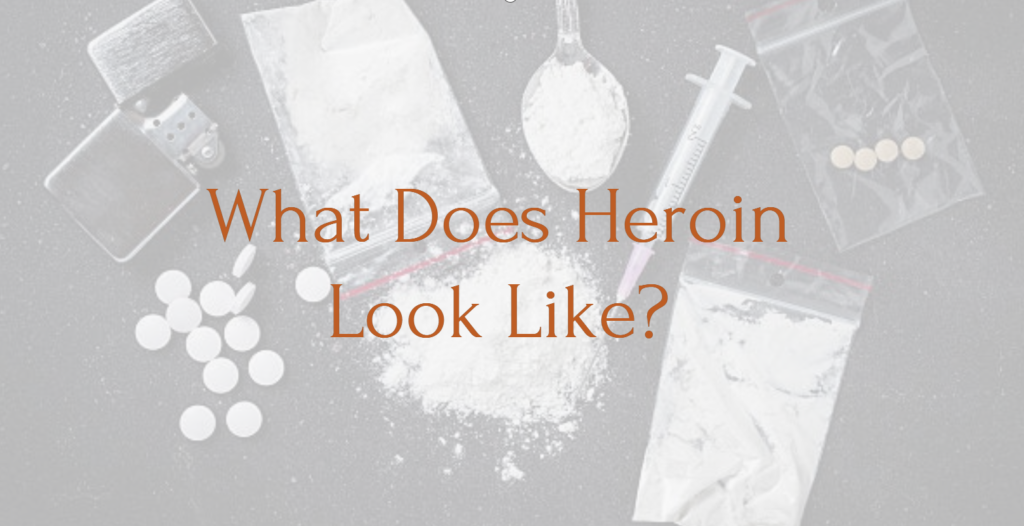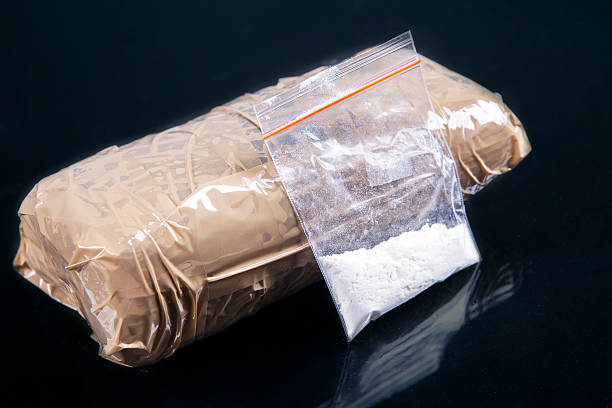Do you know what heroin is and what does heroin look like? Among all the drugs, heroin has a really bad reputation. It is often kept secret and not discussed openly, even more so than cocaine, and maybe only second to meth.
The thing is, heroin is very common, and it is currently considered a kind of epidemic in the U.S., mainly due to people getting addicted to prescription opioids. Not being aware of what heroin is can make it even more dangerous than it already is.
So, here is what you should know about heroin; what it actually is and how to know if someone is using this dangerous drug, and what does heroin look like?
Read Also: What Does Meth Look Like?
What Is Heroin?

Herpin is an illegal opioid drug that comes from morphine. Which in turn is extracted from the opium poppy plant. It belongs to drugs known as narcotics. Heroin is mainly sold as a white or brown powder or sometimes as a sticky black substance known as “black tar” heroin. It can be smoked, injected, or snorted into the veins, producing a rapid euphoric effect on the user. Heroin is highly addictive and can destroy the mental and physical health of the person who is consuming it. It is also linked with a number of legal or social problems.
Read Also: What Does Fentanyl Look Like
What Does Heroin Look Like?

Heroin can come in different forms and appearances. It is mainly found as a brown or white powder which is similar to crystals and granules. The colour may change depending on its purity and the substances it has been mixed with. In some cases, heroin may also appear as a sticky, black, or dark brown substance known as “black tar” heroin.
This form has a consistency like tar and is usually less refined. It is important to note that the appearance of heroin can change, and it is usually adulterated or “cut” with other substances, which makes it difficult to identify its potency or purity visually.
Signs Someone You Care About Might Be Using Heroin
It is important to be aware of the signs that someone you care about may be using heroin. While these signs do not really indicate heroin use, they can be red flags that something may be amiss. Here are some common signs to look out for:
Physical changes: Heroin use can cause some physical changes in a person. Look for symptoms like weight loss, bloodshot or droopy eyes, pinpoint or constricted pupils, track marks from injections, and frequent nose bleeds (if heroin is being snorted).
Behavioural changes: Heroin use usually leads to significant changes in behaviour. Watch for some sudden mood swings, lying or deceptive behaviour, increased secrecy, and declining performance at work or school.
Financial problems: Heroin addiction can be expensive, and people may start experiencing financial problems. They may frequently borrow money, sell personal assets, or ask for financial help. Keep an eye out for unexplained unusual requests for money.
Neglecting responsibilities: As heroin use takes hold, people may neglect their obligations and duties. This can include a decline in performance at school or work, frequent tardiness or absences, and strained relationships with friends and family.
Physical and psychological symptoms: Heroin use can result in different psychological and physical symptoms. Look for signs like nodding off, drowsiness, or falling asleep at inappropriate times, impaired coordination, slurred speech, memory problems, depression, anxiety, and sudden changes in energy levels.
It is important to approach the situation with understanding. If you suspect someone may be using heroin, it is advised to take help or guidance from addiction specialists or doctors.
Read Also: What does Meth smell like?
Why Do People Use Heroin
People use heroin for different reasons, but it is important to know that heroin use is linked with some negative consequences and risks. Some common reasons why people may use heroin like:
Pleasure and euphoria: Heroin is a potent opioid drug that produces feelings of pleasure, euphoria, or relaxation. The drug activates the reward system of the brain, temporarily escaping physical or emotional pain and inducing a sense of health.
Pain relief: Heroin is a powerful painkiller, and some people may turn to it for relief from chronic pain or to self-medicate when other pain management options are ineffective or unavailable.
Emotional escape or coping mechanism: Heroin can serve as a way for people to get out of emotional distress or cope with difficult life situations. It can temporarily anxiety, numb emotional pain, or stress, giving emotional relief.
Peer pressure and social influence: Some people may start using heroin due to peer pressure or the influence of family or friends who are already using the drug. The need to fit in or be accepted within a certain social group can contribute to initial experimentation with heroin.
Curiosity and experimentation: Curiosity about the effects of drugs or a desire to find the altered state of consciousness can lead some people to try heroin, often unaware of the risks and addictive nature of the drug.
It is important to emphasize that heroin use is addictive and dangerous. The short-term pleasure of heroin is usually overshadowed by the long-term health risks, the potential for addiction, or social consequences. Taking the help of doctors is important for people struggling with the use of heroin.
How To Get Help
If someone you know is struggling with the use of heroin, taking help is important for overcoming addiction or promoting recovery. Here are some steps you can take to get help:
Reach out to the doctor: Start by consulting a doctor, like a counsellor or addiction specialist. They can provide guidance, conduct assessments, and recommend appropriate treatment options.
Find treatment options: There are some treatment options available for heroin addiction, including inpatient rehabilitation centres, outpatient programs, and medication-assisted treatment (MAT). Your doctor can help you understand the different options and know the most suitable approach based on the need of people.
Read Now: Top Rehab Centers in the USA; Best Rehab Near Me!
Find support groups: Joining support groups, like Narcotics Anonymous (NA) or other recovery-focused groups, can give invaluable guidance and support throughout the journey to recovery. These groups offer a safe space to share experiences, receive encouragement, and learn from others who have faced the same challenges.
Joining support groups, such as Narcotics Anonymous (NA) or other recovery-focused groups, can provide invaluable support and guidance throughout the journey to recovery. These groups offer a safe space to share experiences, receive encouragement, and learn from others who have faced similar challenges.
Involved loved ones: Inform and involve trusted family members and friends about the situation. Their support can be important in giving emotional support and help throughout the recovery process.
Consider therapy: Individual therapy or counselling can help to address underlying issues contributing to heroin use and develop coping strategies for relapse prevention. Therapists can use different approaches, like cognitive-behavioural therapy (CBT) or motivational interviewing, to support recovery.
Explore community resources: Research loca; resources like non-profitable organizations or government-funded programs that provide addiction treatment and support services. These resources may offer financial help or specialized programs tailored to specific needs.
Take care of physical and mental health: Focus on overall health by adopting a healthy lifestyle. This includes engaging in regular physical exercise, maintaining a nutritious diet, getting enough sleep, and taking the help of doctors for any co-occurring mental health conditions.
Don’t forget to take help is a courageous step towards recovery. Do not hesitate to contact doctors and support networks who can give the help and guidance needed to overcome heroin addiction.
Read More: What Does Heroin Look Like?- How To Get High Without Drugs?
- MARIJUANA ABUSE: WHAT IS GREENING OUT MEAN?
- NYC Urgent Care: What drugs should not be taken with benzonatate?
- What Is Crank Drug?
- What Are Blues Drugs?
- Top Rehab Centers in the USA; Best Rehab Near Me!
- What Are Whippets Drugs? Is it safe to consume?
- TCL 341 Pill | Uses, Side Effects, and More
- Cymbalta Withdrawal: Side Effects & Symptoms
- How long does Suboxone withdrawal last?
- Suboxone Strips: Effective and Convenient Treatment for Opioid Dependency
- Do Shrooms Go Bad Over Time?
- Understanding EtOH: The Dangers of Ethanol Alcohol Abuse
- Mushrooms That Look Like a Penis
- Melmac Mushrooms
- How to Dry Mushrooms
- How to Pass a Hair Follicle Drug Test: A Comprehensive Guide
- Embalming Fluid Smoking
- Meth Face Sores & Scabs: A Comprehensive Guide
- Concerta Drug Test Detection: Everything You Need to Know (2023)

I am a passionate technology and business enthusiast, constantly exploring the intersection where innovation meets entrepreneurship. With a keen eye for emerging trends and a deep understanding of market dynamics, I provide insightful analysis and commentary on the latest advancements shaping the tech industry.
